Time to Harass Women and Minorities Again
Roughly four-in-x Americans have experienced online harassment, with one-half of this group citing politics every bit the reason they recollect they were targeted. Growing shares confront more than astringent online abuse such as sexual harassment or stalking
Pew Research Center has a history of studying online harassment. This report focuses on American adults' experiences and attitudes related to online harassment. For this analysis, we surveyed 10,093 U.South. adults from Sept. 8 to 13, 2020. Everyone who took part is a member of the Center'south American Trends Panel (ATP), an online survey panel that is recruited through national, random sampling of residential addresses. This way nearly all U.South. adults have a chance of pick. The survey is weighted to exist representative of the U.Southward. developed population past gender, race, ethnicity, partisan amalgamation, teaching and other categories. Read more virtually the ATP's methodology. Here are the questions used for this report, along with responses, and its methodology.
Stories nigh online harassment have captured headlines for years. Across the more than severe cases of sustained, aggressive corruption that brand the news, proper name-calling and belittling, derisive comments accept come to characterize how many view discourse online – specially in the political realm.
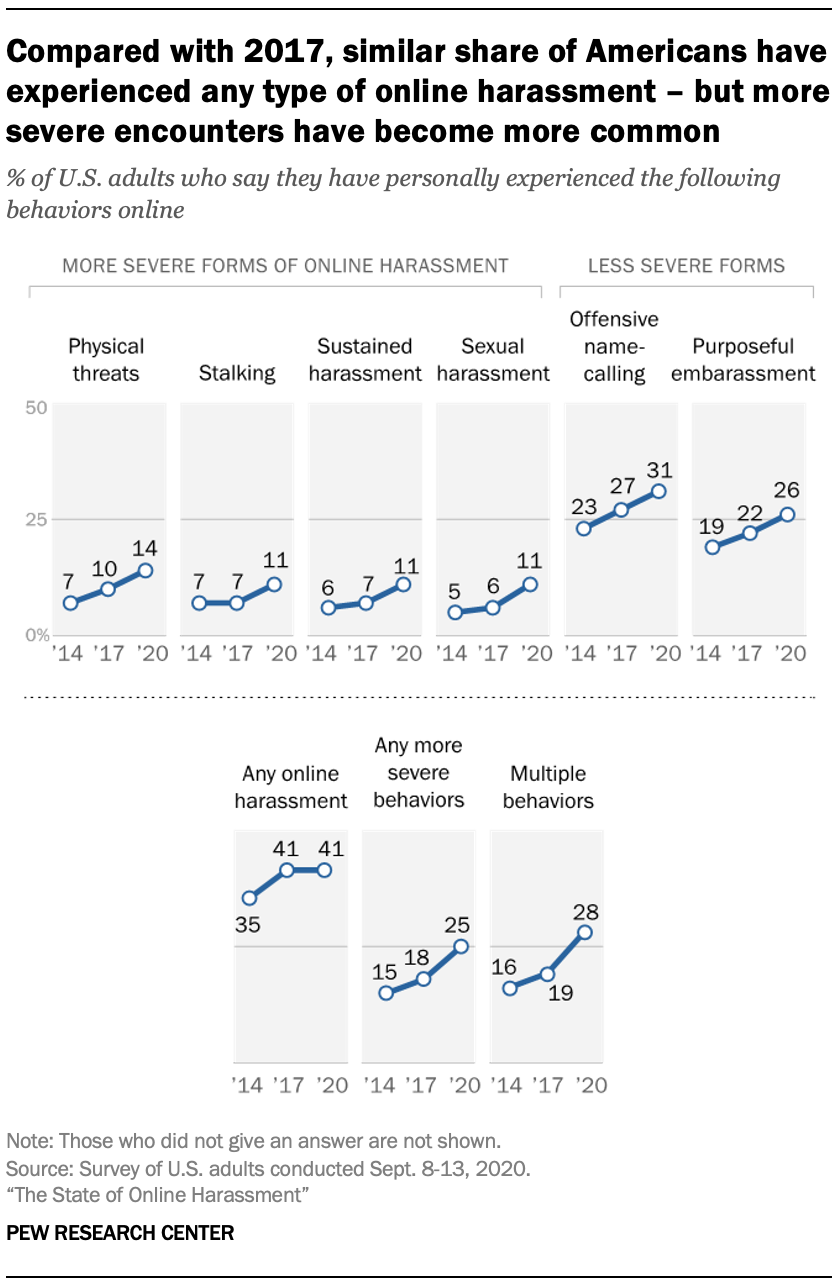
A Pew Research Center survey of U.Southward. adults in September finds that 41% of Americans have personally experienced some form of online harassment in at to the lowest degree 1 of the six key ways that were measured. And while the overall prevalence of this type of corruption is the same equally information technology was in 2017, there is evidence that online harassment has intensified since then.
To begin with, growing shares of Americans report experiencing more severe forms of harassment, which encompasses concrete threats, stalking, sexual harassment and sustained harassment. Some 15% experienced such issues in 2014 and a slightly larger share (18%) said the aforementioned in 2017.i That group has risen to 25% today. Additionally, those who have been the target of online corruption are more likely today than in 2017 to report that their most recent feel involved more varied types and more than astringent forms of online abuse.
In a political environs where Americans are stressed and frustrated and contempt has grown, online venues often serve as platforms for highly contentious or even extremely offensive political debate. And for those who accept experienced online corruption, politics is cited as the peak reason for why they remember they were targeted.
Defining online harassment
This report measures online harassment using six singled-out behaviors:
- Offensive name-calling
- Purposeful embarrassment
- Stalking
- Physical threats
- Harassment over a sustained period of fourth dimension
- Sexual harassment
Respondents who signal they have personally experienced any of these behaviors online are considered targets of online harassment in this report. Further, this report distinguishes between "more severe" and "less severe" forms of online harassment. Those who take only experienced name-calling or efforts to embarrass them are categorized in the "less astringent" group, while those who have experienced any stalking, concrete threats, sustained harassment or sexual harassment are categorized in the "more than severe" group.
Indeed, twenty% of Americans overall – representing half of those who accept been harassed online – say they accept experienced online harassment because of their political views. This is a notable increment from three years agone, when fourteen% of all Americans said they had been targeted for this reason. Beyond politics, more than also cite their gender or their racial and ethnic background as reasons why they believe they were harassed online.
While these kinds of negative encounters may occur anywhere online, social media is by far the virtually common venue cited for harassment – a pattern consistent across the Center's work over the years on this topic. The latest survey finds that 75% of targets of online abuse – equaling 31% of Americans overall – say their most recent feel was on social media.
As online harassment permeates social media, the public is highly disquisitional of the manner these companies are tackling the outcome. Fully 79% say social media companies are doing an only fair or poor chore at addressing online harassment or bullying on their platforms.
But fifty-fifty as social media companies receive low ratings for treatment abuse on their sites, a minority of Americans back the thought of belongings these platforms legally responsible for harassment that happens on their sites. Just 33% of Americans say that people who take experienced harassment or bullying on social media sites should be able to sue the platforms on which information technology occurred.
These are some of the key findings from a nationally representative survey of x,093 U.South. adults conducted online Sept. 8 to 13, 2020, using Pew Research Center'southward American Trends Console. The following are among the major findings.
41% of U.South. adults accept personally experienced online harassment, and 25% have experienced more severe harassment
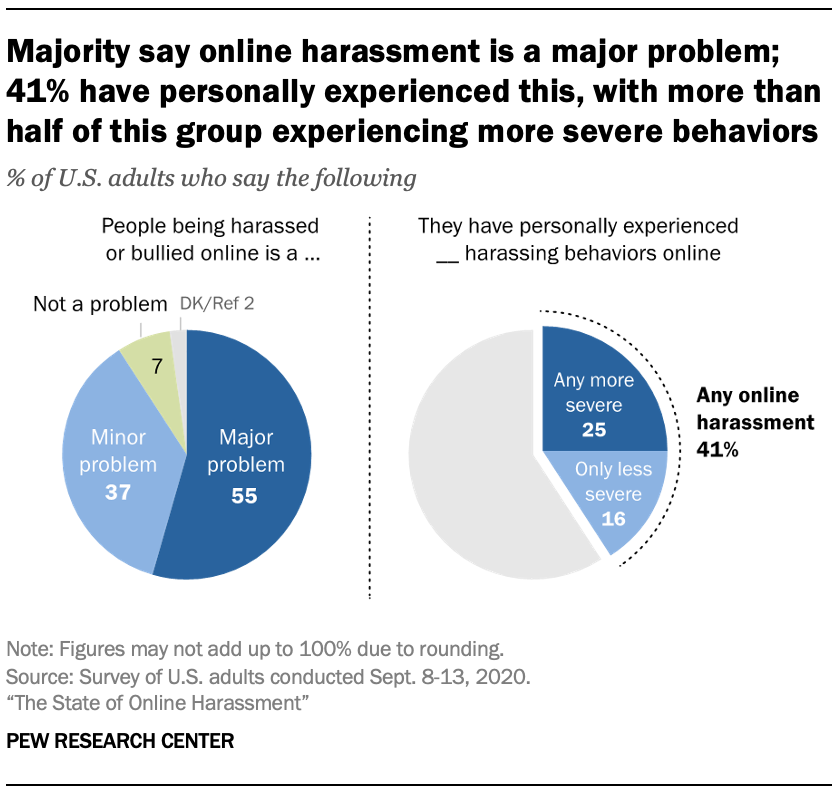
On a broad level, Americans agree that online harassment is a problem plaguing digital spaces. Roughly nine-in-ten Americans say people being harassed or bullied online is a trouble, including 55% who consider information technology a major problem.
Many Americans have likewise had their ain experience with existence targeted online. While about four-in-ten Americans (41%) have experienced some form of online harassment, growing shares have faced more than astringent and multiple forms of harassment. For example, in 2014, 15% of Americans said they had been subjected to more severe forms of online harassment. That share is now 25%. There has also been a double-digit increase in those experiencing multiple types of online abuse – rise from 16% to 28% since 2014. This number is also up since 2017, when 19% of Americans had experienced multiple forms of harassing behaviors online.
Many private types of behaviors are on the rise equally well. The shares of Americans who say they accept been called an offensive name, purposefully embarrassed or physically threatened while online have all risen since 2014. Still, the share who take experienced whatsoever of the less severe behaviors is largely on par with that of 2017 (37% in 2020 vs. 36% in 2017).
A majority of younger adults have encountered harassment online
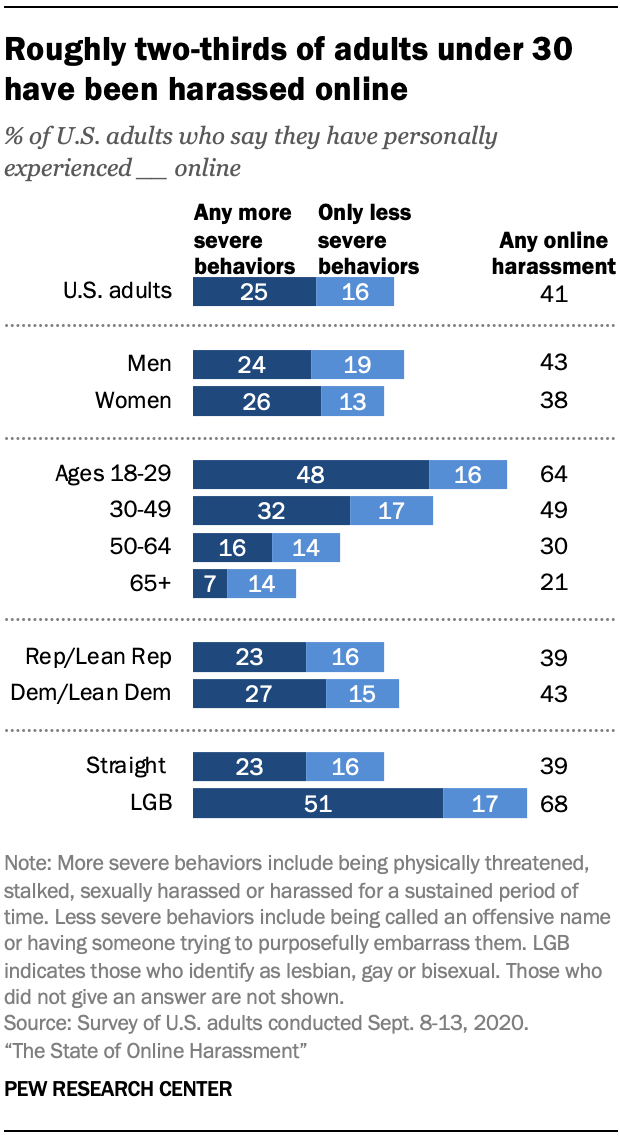
Online harassment is a particularly common feature of online life for younger adults, and they are particularly decumbent to facing harassing behaviors that are more than serious. Roughly two-thirds of adults under xxx (64%) have experienced any form of the online harassment activities measured in this survey – making this the simply age group in which a majority take been subjected to these behaviors. Nonetheless, about half of 30- to 49-twelvemonth-olds have been the target of online harassment, while smaller shares of those ages 50 and older (26%) have encountered at least 1 of these harassing activities.
A similar pattern is nowadays when looking at those who have faced more astringent forms of online abuse: 48% of 18- to 29-twelvemonth-olds have been targeted online with more astringent behaviors, compared with 32% of those ages xxx to 49 and merely 12% of those 50 and older.
Gender too plays a part in the types of harassment people are probable to meet online. Overall, men are somewhat more than likely than women to say they have experienced whatever class of harassment online (43% vs. 38%), merely similar shares of men and women have faced more severe forms of this kind of abuse. There are also differences across individual types of online harassment in the types of negative incidents they have personally encountered online. Some 35% of men say they take been called an offensive name versus 26% of women, and being physically threatened online is more mutual occurrence for men rather than women (16% vs. eleven%).
Women, on the other paw, are more probable than men to written report having been sexually harassed online (16% vs. 5%) or stalked (13% vs. ix%). Young women are particularly likely to have experienced sexual harassment online. Fully 33% of women under 35 say they take been sexually harassed online, while eleven% of men under 35 say the same.
Lesbian, gay or bisexual adults are particularly probable to face up harassment online. Roughly seven-in-ten have encountered any harassment online and fully 51% have been targeted for more severe forms of online abuse. By comparison, well-nigh four-in-ten direct adults have endured any grade of harassment online, and simply 23% have undergone any of the more severe behaviors.
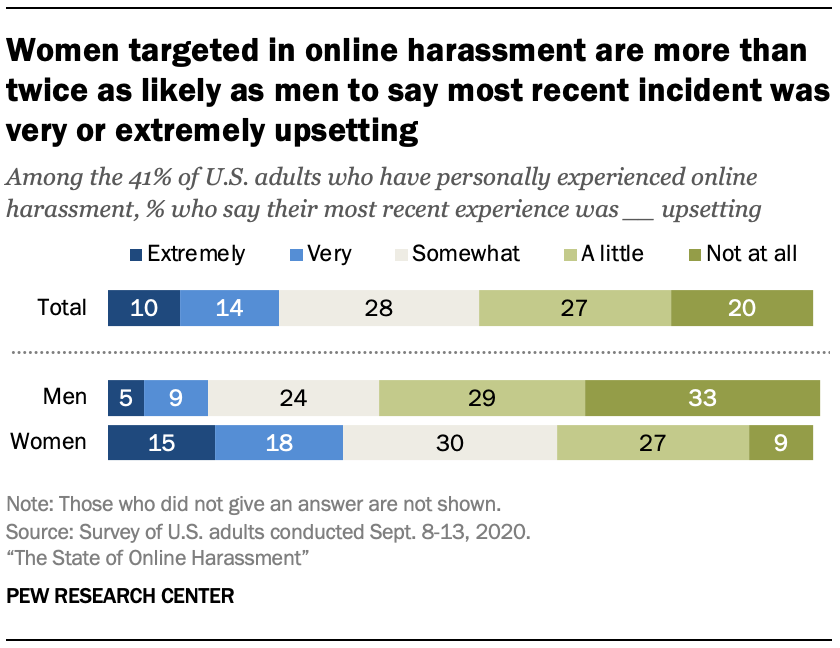
While men are somewhat more likely than women to experience harassment online, women are more than likely to exist upset about information technology and think it is a major problem. Some 61% of women say online harassment is a major trouble, while 48% of men agree. In addition, women who have been harassed online are more than twice as likely as men to say they were extremely or very upset by their most contempo encounter (34% vs. 14%). Conversely, 61% of men who accept been harassed online say they were not at all or a lilliputian upset past their most contempo incident, while 36% of women said the aforementioned. Overall, 24% of those who take experienced online harassment say that their virtually recent incident was extremely (x%) or very (fourteen%) upsetting.
One-in-five adults study being harassed online for their political views
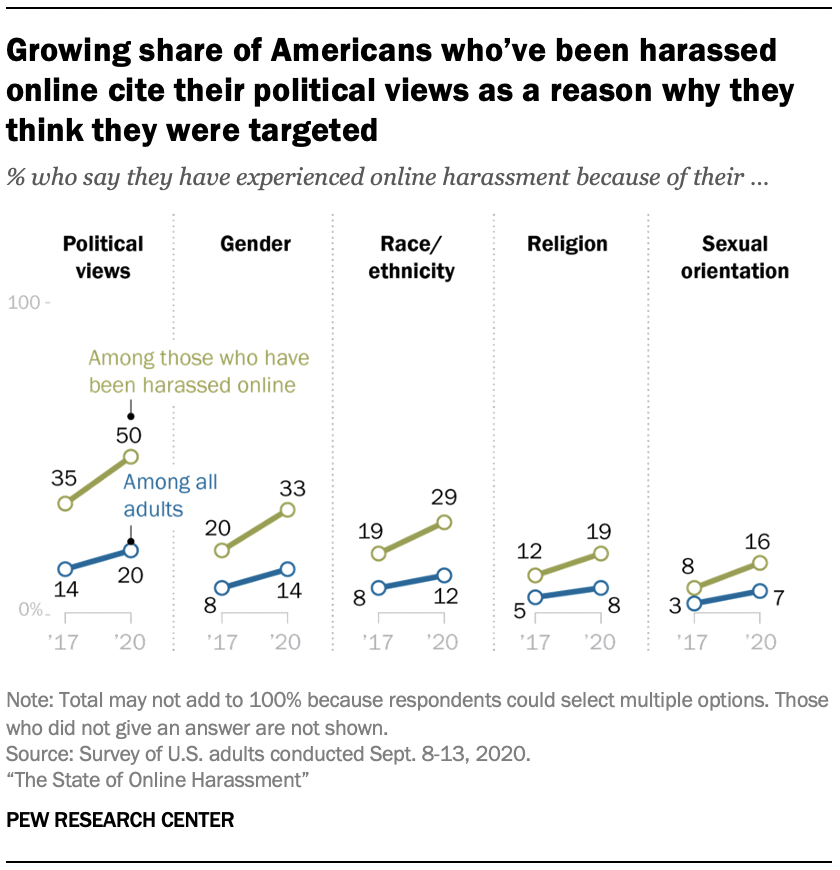
Those who have been harassed were then asked whether they believed certain personal characteristics – political views, gender, race or ethnicity, religion or sexual orientation – played a role in the attacks. Fully 20% of all adults – or 50% of online harassment targets – say they have been harassed online because of their political views. At the same fourth dimension, 14% of U.Due south. adults (33% of people who have been harassed online) say they have been harassed based on their gender, while 12% say this occurred because of their race or ethnicity (29% of online harassment targets). Smaller shares point to their faith or their sexual orientation equally a reason for their harassment.
Each of these reasons has risen since the Centre last asked these questions in 2017. There take been 6 percent point increases in the shares of Americans attributing their harassment to their political views as well as gender. Race or ethnicity, sexual orientation and religion each saw a small rising since 2017.
There are several demographic differences regarding who has been harassed online for their gender or their race or ethnicity. Amid adults who accept been harassed online, roughly half of women (47%) say they think they take encountered harassment online because of their gender, whereas xviii% of men who have been harassed online say the aforementioned. Similarly, well-nigh half or more Blackness (54%) or Hispanic online harassment targets (47%) say they were harassed due to their race or ethnicity, compared with 17% of White targets.
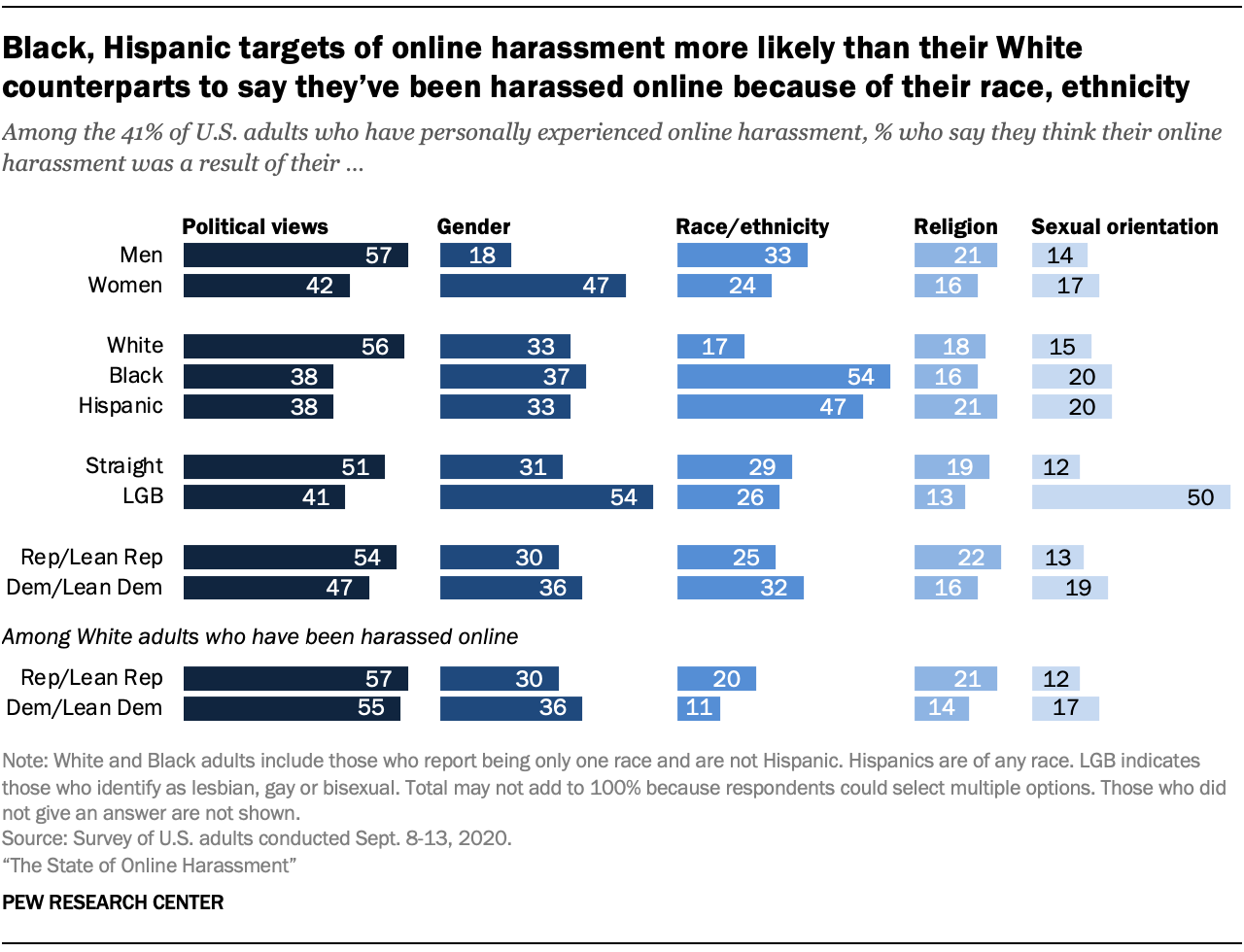
While small shares overall say their harassment was due to their sexual orientation, 50% of lesbian, gay or bisexual adults who have been harassed online say they call back information technology occurred because of their sexual orientation.2 Past comparing, only 12% of directly online harassment targets say the aforementioned. Lesbian, gay or bisexual online harassment targets are too more likely to report having encountered harassment online because of their gender (54%) compared with their straight counterparts (31%).
Men and White adults who have been harassed online are particularly likely to say this harassment was a outcome of their political views. Harassed men are a full 15 per centum points more than likely than their female counterparts to cite political views as the reason they were harassed online (57% vs. 42%). Similarly, White online harassment targets are 18 points more than likely than Black or Hispanic targets to bespeak to their political views as the reason they were targeted for abuse online.
And while there are some partisan differences in citing political views every bit the perceived goad for facing harassment, these differences exercise not hold when bookkeeping for race and ethnicity. For example, White Democrats and Republicans, including independents who lean toward each corresponding party, who have been harassed are about every bit likely to say their political views were the reason they were harassed (55% vs. 57%).
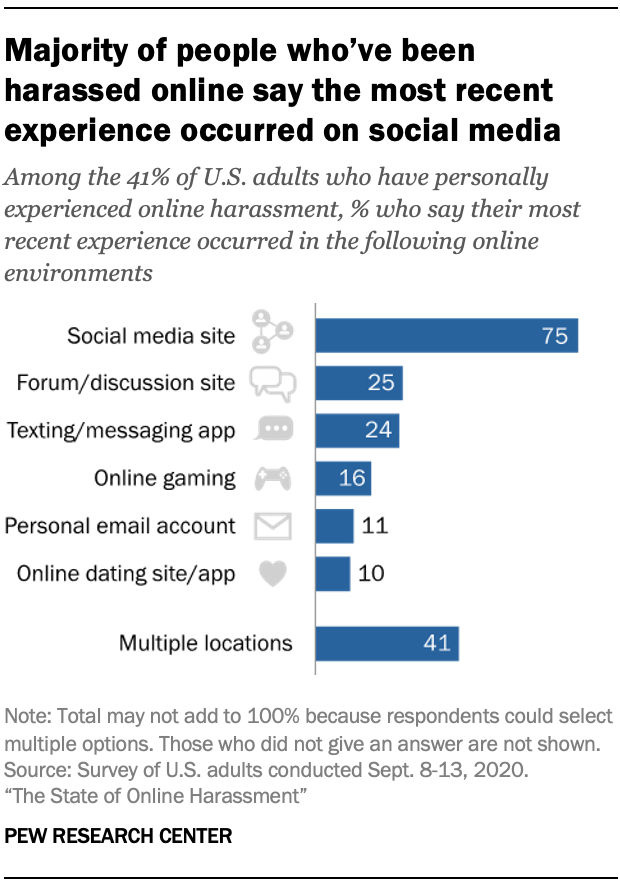
As was truthful in previous Eye surveys about online harassment, social media go on to be the about commonly cited online venues where harassment takes place. When asked where their most recent experience with online harassment occurred, 75% of targets of this blazon of abuse say information technology happened on social media.
By comparison, much smaller shares of this group mention online forums or discussion sites (25%) or texting or messaging apps (24%) equally the location where their most recent experience occurred, while about one-in-ten or more cite online gaming, their personal email account or a dating site or app. In total, 41% of targets of online harassment say their most recent experience of harassment spanned more than one venue.
While social media are the nearly commonly cited online spaces for both men and women to say they have been harassed, women who have been harassed online are more probable than men to say their most recent experience was on social media (a thirteen percentage point gap). On the other hand, men are more than probable than women to report their most contempo experience occurred while they were using an online forum or discussion site or while online gaming (both with a 13-point gap).
While most Americans feel that harassment and bullying are a problem online, the fashion to address this issue remains up for argue. The policies used to combat harassment and the transparency in reporting how content is being moderated vary drastically across online platforms. Social media companies have been highly criticized for their current tactics in addressing harassment, with advocates maxim these companies should exist doing more.
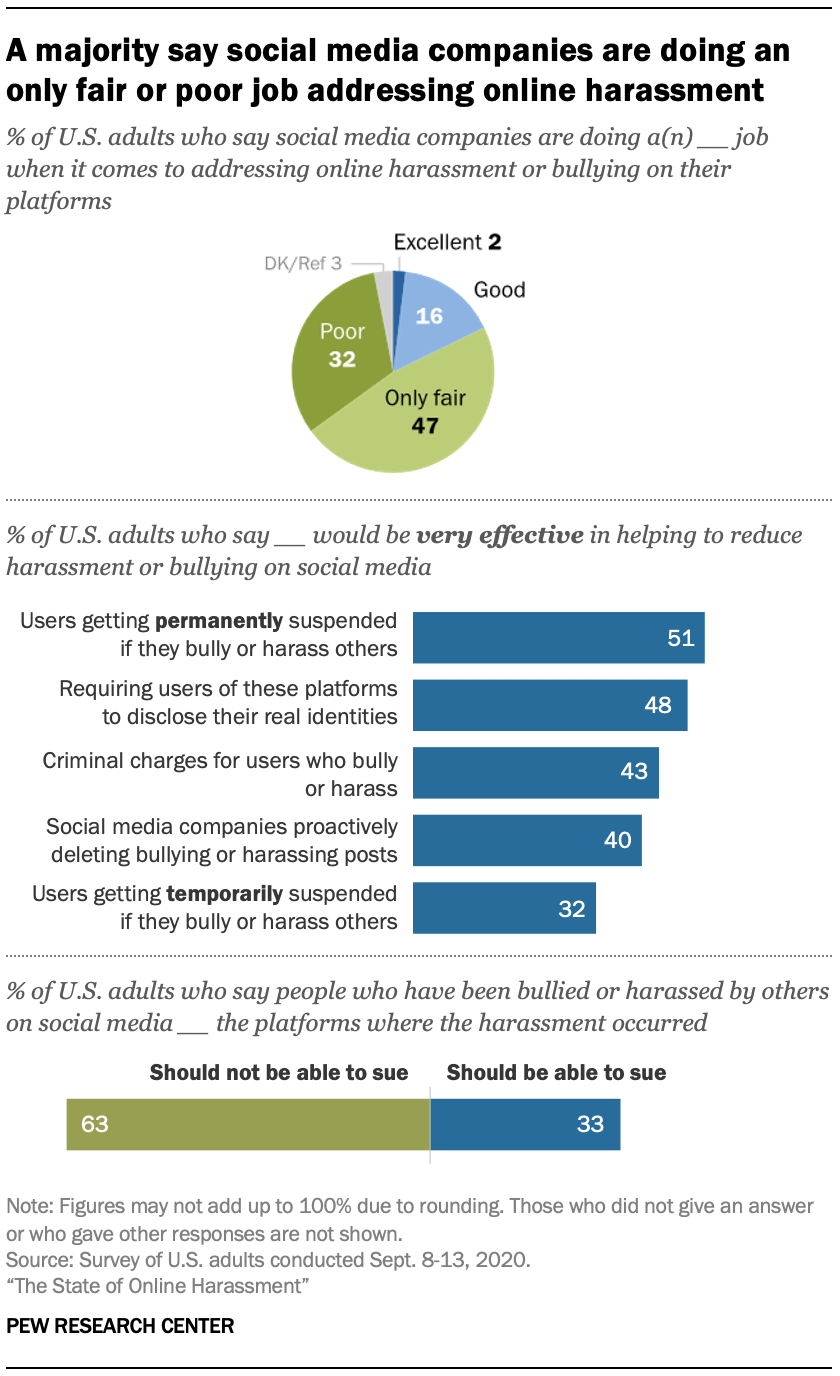
The public is similarly critical of social media companies. When asked to rate how well these companies are addressing online harassment or bullying on their platforms, just 18% say social media companies are doing an excellent or adept chore. Much larger shares – roughly eight-in-10 – say these companies are doing an only fair or poor job.
Despite about Americans existence disquisitional of the chore social media companies are doing to accost harassment, some are optimistic about a variety of possible solutions asked about in the survey that could be enacted to combat online harassment.
Nearly half of Americans say permanently suspending users if they dandy or harass others (51%) or requiring users of these platforms to disclose their real identities (48%) would be very effective in helping to reduce harassment or bullying on social media.
Effectually 4-in-ten say criminal charges for users who bully or harass (43%) or social media companies proactively deleting bullying or harassing posts (40%) would exist very effective.
Temporary bans are deemed the least effective solution about which respondents were asked. A third (32%) of Americans say users getting temporarily suspended if they bully or harass others would be a very effective measure against harassment. When it comes to holding social media companies accountable for the harassment on their platforms, few recall personal lawsuits should be the solution. A tertiary of adults say people who accept been bullied or harassed by others on social media should be able to sue the platforms where the harassment occurred, whereas a much larger share – 63% – believe targets of online abuse should not exist able to bring legal activity against social media sites.
Source: https://www.pewresearch.org/internet/2021/01/13/the-state-of-online-harassment/
Postar um comentário for "Time to Harass Women and Minorities Again"